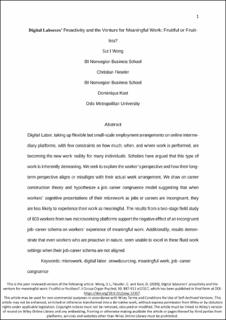Digital labourers’ proactivity and the venture for meaningful work: Fruitful or fruitless?
Peer reviewed, Journal article
Accepted version
Permanent lenke
https://hdl.handle.net/11250/3014594Utgivelsesdato
2020-06-10Metadata
Vis full innførselSamlinger
- Publikasjoner fra Cristin [3269]
- SAM - Handelshøyskolen [392]
Originalversjon
Journal of Occupational and Organizational Psychology. 2020, . https://doi.org/10.1111/joop.12317Sammendrag
Digital Labor, taking up flexible but small-scale employment arrangements on online intermediary platforms, with few constraints on how much, when, and where work is performed, are becoming the new work reality for many individuals. Scholars have argued that this type of work is inherently demeaning. We seek to explore the worker’s perspective and how their long-term perspective aligns or misaligns with their actual workarrangement. We draw on career construction theory and hypothesize a job–career congruence model suggesting that when workers’ cognitive presentations of their microwork as jobs or careers are incongruent, they are less likely to experience their work as meaningful. The results from a two-stage field study of 803 workers from two microworking platforms support the negative effect of an incongruent job–career schema on workers’ experience of meaningful work. Additionally, results demonstrate that even workers who are proactive in nature, seem unable to excel in these fluid work settings when their job-career schema are not aligned.
